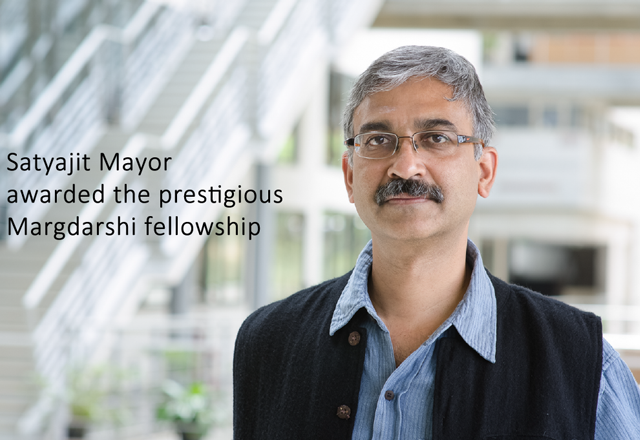Prof. Satyajit Mayor, Director, National Centre for Biological Sciences (NCBS) and Institute for Stem Cell Biology and Regenerative Medicine (inStem), is the latest recipient of the prestigious Margdarshi fellowship.
The Margdarshi fellowship enables established, senior scientists to nucleate and lead novel research programs in India. The principal mandate of the program is to generate contemporary centres of excellence by employing innovative approaches, creating new infrastructure and building collaborations in frontier areas of science. The fellowship is aimed at using the expertise of a visionary scientist to seed new areas of research in India by mentoring young researchers while also building partnerships both within the Indian scientific community and globally. Prof. Mayor is one of only three recipients of this international and highly competitive scheme awarded by the Wellcome Trust/DBT India Alliance.
Prof. Mayor has been working on understanding the structure and function of the cell membrane for nearly two decades. Using a combination of diverse approaches such as theoretical soft-matter physics (in collaboration with Prof. Madan Rao), chemistry and cell biology, his research has focussed on the dynamics of membrane function, especially those associated with receptor signalling and membrane traffic. Prof. Mayor's work has resulted in a deeper understanding of the importance of endocytosis in cellular and tissue functions - including the self-organising mechanisms of local membrane environments that fine-tune signalling processes in the cell.
There are however, a range of questions across several scales that have been generated by these insights into cell membrane dynamics - questions that require the support of a Margdarshi fellowship in order to be addressed. At a local or mesoscopic scale, in the order of nanometers, receptors are known to regulate local lipid compositions in the cell membrane via cell cytoskeletal elements. In order to test hypotheses about the mechanisms by which these phenomena occur, in vitro membrane systems need to be constructed using cell membrane components. At the micron scale, questions involving changes in the composition of specific parts or even the entire cell membrane need to be addressed. In this, lipidomics assays would allow investigation of the roles played by exo-endocytic pathways, lipid trafficking systems and diet on membrane compositional alterations. Variations in local and global membrane compositions affect physiological processes such as stem cell differentiation. In order to understand the regulation and functional aspects of local and global membrane organisation, a deeper insight into the machinery that links membrane proteins and lipids to the cell cytoskeleton is also needed.
"The scope and vista of possibilities that an award of this kind opens up are extremely exciting, and I am delighted to receive this prestigious fellowship, since it takes the foundation that we have built to the next level. I am very excited to probe how a cell regulates its membrane composition, and programme support from the DBT-Alliance that this fellowship offers is just the right thing that can help build the platform for this interdisciplinary research", says Prof. Mayor.
To initiate such investigations, novel approaches involving joint efforts from various fields are required. Prof. Mayor's proposed investigations will establish and strengthen collaborative links between his team and other researchers from within NCBS, the Regulation of Cell fate theme at inStem, as well as across world-class institutions like the St Johns Medical College, Max Planck Institute of Molecular Cell Biology and Genetics, Dresden and the Centre for Genomic Regulation (CRG), Barcelona. The Bangalore Life Science Cluster with its state-of-the-art facilities in cell and molecular biology, high-end imaging systems, proteomics and lipidomics analysis capabilities is an ideal host institution to support these new directions and the collaborative links are expected to facilitate many of the research directions envisaged via the new award.
"We are delighted with the award of the Margadarshi fellowship to Jitu Mayor, a recognized leader in the field of membrane biology. This program brings an exciting new direction to Jitu's research and truly reflects his ability to set up interdisciplinary team efforts and his scientific engagement, which have fostered collaborations across the world. At a more personal level, it's a great opportunity for the nascent Regulation of Cell Fate theme at inStem to be associated with this venture, as Jitu can almost always be relied upon to push the frontiers of any problem that he works on! This prestigious fellowship, also recognizes the very fine body of work accomplished over the years by his lab at NCBS and inStem is proud to co-host with NCBS the first such fellowship awarded to the campus", says Prof. Apurva Sarin, Dean of inStem.
"I'm delighted that Prof.Mayor's research has been recognized and supported by the India Alliance and the Margdarshi award. The proposed research takes an already impressive programme on membrane function in cell biology to a new level. I look forward to this catalysing many new kinds of science on campus through collaborations and new experiemntal models that cut across multiple scales of investigation, " says Prof. Upinder Bhalla, Dean of NCBS.
We wish Prof. Mayor and his collaborators all the very best in their new initiatives!
For more about Prof. Satyajit Mayor's work, please visit: https://www.ncbs.res.in/faculty/mayor
For more about the Margdarshi Fellowships, please visit: http://www.wellcomedbt.org/fellowshiptype/margdarshi-fellowships










0 Comments